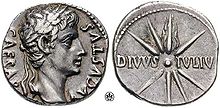
A denarius minted c. 18 BC. Obverse: CAESAR AVGVSTVS; reverse: DIVVSIVLIV[S] (DIVINE JULIUS)
Further information: Liberators' civil war
On 1 January 42 BC, the Senate posthumously recognized Julius Caesar as a divinity of the Roman state, Divus Iulius. Octavian was able to further his cause by emphasizing the fact that he was Divi filius, "Son of God"Antony and Octavian then sent 28 legions by sea to face the armies of Brutus and Cassius, who had built their base of power in Greece. After two battles at Philippi in Macedonia in October of 42, the Caesarian army was victorious and Brutus and Cassius committed suicide. Mark Antony would later use the examples of these battles as a means to belittle Octavian, as both battles were decisively won with the use of Antony's forces. In addition to claiming responsibility for both victories, Antony also branded Octavian as a coward for handing over his direct military control to Marcus Vipsanius Agrippa instead.After Philippi, a new territorial arrangement was made among the members of the Second Triumvirate. While Antony placed Gaul, the provinces of Hispania, and Italia in the hands of Octavian, Antony traveled east to Egypt where he allied himself with Queen Cleopatra VII, the former lover of Julius Caesar and mother of Caesar's infant son, Caesarion. Lepidus was left with the province of Africa, stymied by Antony who conceded Hispania to Octavian instead. Octavian was left to decide where in Italy to settle the tens of thousands of veterans of the Macedonian campaign whom the triumvirs had promised to discharge. The tens of thousands who had fought on the republican side with Brutus and Cassius, who could easily ally with a political opponent of Octavian if not appeased, also required land. There was no more government-controlled land to allot as settlements for their soldiers, so Octavian had to choose one of two options: alienating many Roman citizens by confiscating their land, or alienating many Roman soldiers who could mount a considerable opposition against him in the Roman heartland; Octavian chose the former. There were as many as eighteen Roman towns affected by the new settlements, with entire populations driven out or at least given partial evictions.
0 comments:
Post a Comment